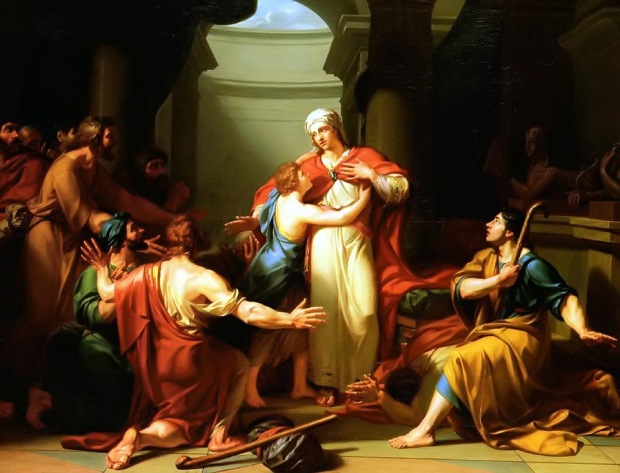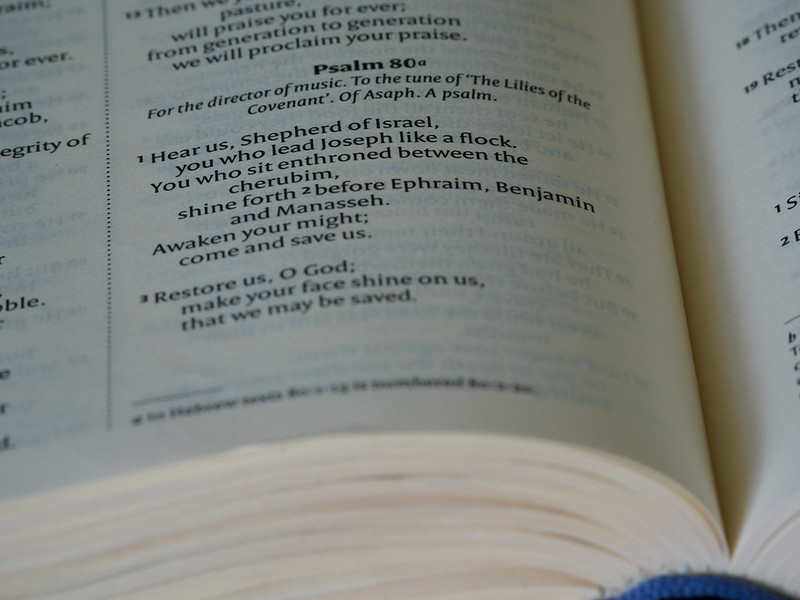
“Joseph Recognized by His Brothers” by Jean-Charles Tardieu (1788)
START WITH SCRIPTURE:
Genesis 45:3-11, 15
CLICK HERE TO READ SCRIPTURE ON BIBLEGATEWAY.COM
A NOTE FROM CELESTE LETCHWORTH:
As most of you know, Tom went to be with the Lord 7 months ago.
Since the lectionary cycles every 3 years, I am able to copy Tom’s SOAR studies from the archives and post them each week with our current year’s dates.
However — since Easter falls so late in 2019, this Sunday (February 24, 2019) is the Seventh Sunday after the Epiphany. We haven’t had a Seventh Sunday after the Epiphany for Cycle C since way before Tom started a Lectionary Bible Study.
I was able to find the following SOAR study that Tom wrote for Genesis 45:1-15 (this week’s Old Testament reading is only verses 3-11 and 15). He posted it for August 20, 2017.
OBSERVE:
When Joseph’s envious brothers sold him into slavery, he was seventeen years old (Genesis 37:2). When Joseph came to the attention of Pharaoh for his uncanny ability to interpret dreams, he was thirty (Genesis 41:46). Those intervening thirteen years were tough — he was first a slave and then a prison inmate, imprisoned on false allegations of sexual assault.
Joseph’s status dramatically changes. When he interprets the Pharaoh’s dreams and predicts seven years of abundant crops in Egypt followed by seven years of famine, his rise to power is meteoric. The Pharaoh has such confidence in this convict that he makes Joseph second in power and authority in Egypt only to himself!
Seven years of abundance followed by two years of famine have elapsed. Canaan has also been hit hard by the famine. Joseph is at least thirty-nine years old when his ten brothers come from Canaan to buy food. (Benjamin is not with them on their first visit.)
Joseph has been a wise vice regent to the Pharaoh — he has made sure that plentiful grain was stored during the abundant years. Egypt is the only nation that has a surplus of grain.
It should be no surprise that when Joseph’s ten brothers come to Egypt, they don’t recognize Joseph, although he recognizes them (Genesis 42:7). But Joseph keeps his identity secret from his brothers — for now. Joseph was a teenager when they last saw him, shackled in the possession of the Ishmaelites. He has matured and grown into a man, no doubt seasoned by adversity. Also, the differences of culture and fashion between the Hebrew bedouin and sophisticated Egyptians would certainly explain the failure of the brothers to recognize Joseph. Not to mention the fact that they would never have expected to see their brother Joseph in such a position of power. They assumed he was long dead (Genesis 42:13).
Joseph was pretty rough with his unsuspecting brothers. He accused them of spying on Egypt (Genesis 42:9). He demanded that they bring their youngest brother with them on a second trip in order to prove their sincerity (they have made the mistake of revealing that they have another brother back home with their father Jacob, Genesis 42:13). In the first visit, Joseph incarcerated the ten brothers for three days (Genesis 42:17), and demanded that they leave one of the brothers as a hostage until they return with Benjamin (Simeon was the unlucky choice made by Joseph, Genesis 42:24).
But Joseph is not made of stone. He still understands his brothers when they speak in Hebrew. He hears Reuben castigating his brothers for what they had done so many years earlier against Joseph when they sold him into slavery. Reuben insists that all of this is happening to them because of their guilt from years earlier (Genesis 42:21-24). Joseph is moved to tears by this admission of responsibility. And Joseph secretly insures that the money they have paid for the grain is returned to them in the grain sacks.
When this week’s lectionary text begins, the brothers return for a second visit to Egypt, driven by their shortage of grain. Their father Jacob has very reluctantly allowed his son Benjamin to go with them. This is an indication of their desperate need for food. The brothers also bring gifts, and double the money so that they can compensate Joseph for the first grain that was unpaid for.
The tension in the story grows increasingly intense. The brothers still don’t know who this Egyptian official really is, and Joseph must hide his own intense emotion when he sees his younger brother Benjamin for the first time in more than twenty-two years.
This time, however, Joseph receives them with a demonstration of hospitality. He brings them all into his own home and offers them a feast. This must have greatly puzzled the brothers, who had feared reprisals from Joseph because of his previous accusations and the money they had found in their grain sacks. Everything seems to be fine. Simeon is restored to them. Their grain sacks are again filled to overflowing with grain, and they are sent on their way back to Canaan.
But Joseph ratchets up the pressure. Not only has he had all of the money placed back in their grain sacks, he has his silver divining cup placed in Benjamin’s sack! He then sends his steward — and presumably a detachment of armed soldiers — to pursue the Hebrew brothers, and accuses them of stealing his divining cup.
The crisis has now reached an extreme intensity. They are escorted back to Joseph’s house and fall cringing before him. Joseph offers them a deal — he will let them all go free, but will keep the one whose sack had the cup as a slave. His own brother Benjamin!
Now it is Judah who intercedes, and tells Joseph that if Benjamin doesn’t return to his father Jacob, it will kill the old man. Judah offers himself as a substitute, keeping his promise to his father when he offered to stand as collateral in order to protect Benjamin.
At this, Joseph reaches an emotional breaking point:
Then Joseph couldn’t control himself before all those who stood before him, and he cried, “Cause everyone to go out from me!” No one else stood with him, while Joseph made himself known to his brothers. He wept aloud.
All of the hurt, anger, resentment, loss and sorrow of the twenty-two years since his betrayal by his brothers have come to a head. Joseph’s wailing is so loud that even those in the court of the Pharaoh can hear it.
Now comes the moment when Joseph discloses his true identity. No interpreter is needed. Joseph speaks Hebrew as well as they do. His first question reveals his priorities:
I am Joseph! Does my father still live?
The brothers, understandably, are speechless and terrified. In this moment they don’t know how Joseph will treat them. He has the absolute power of the Pharaoh’s court behind him. Will he put the ten guilty brothers in prison, and adopt Benjamin into his own household? Will he spare Reuben because he wasn’t there when Joseph was sold into slavery? Will Joseph sell all of them into slavery as reprisal? Will he have them all executed? All of these thoughts must have flashed through their minds in this moment of extreme crisis.
But they have misjudged their brother Joseph. His years of servitude and his strange rise to power have given him a new perspective on his experiences, and even mellowed him.
Joseph actually speaks gently to them:
“Come near to me, please.” They came near. “He said, I am Joseph, your brother, whom you sold into Egypt. Now don’t be grieved, nor angry with yourselves, that you sold me here, for God sent me before you to preserve life.”
Joseph is able to see his own life through the theological lens of God’s providence — that all of these experiences have led to this very moment. Joseph knows that the two years of famine that the known world has suffered are only the beginning. There would be five more years of famine.
And then Joseph introduces a concept that will become a recurring theme in Hebrew Scripture and the history of Israel:
God sent me before you to preserve for you a remnant in the earth, and to save you alive by a great deliverance.
Joseph is no doubt keenly aware of his own family story — that their grandfather Abraham had been uniquely called by God into a covenant that was to bless all nations, with numberless descendants. This legacy is threatened by the famine — but Joseph believes that he has been set apart by God as a kind of savior. He has been uniquely placed where he is as a part of the salvation history of Israel.
And in centuries to come the prophets of Israel will speak of the remnant of Israel, even when they are faced with extinction at the hands of the Assyrians or the Babylonians (Amos 5:15; Isaiah 10:21; Jeremiah 23:3 and Micah 5:8 are just a few of the many examples of this concept in Scripture).
Joseph continues with his theological interpretation of his own life:
So now it wasn’t you who sent me here, but God, and he has made me a father to Pharaoh, lord of all his house, and ruler over all the land of Egypt.
And this theological reflection is then followed up by a call to action. Joseph tells them to hurry back to Canaan and tell their father Jacob that Joseph is alive, is lord of all Egypt, and to bring Jacob back to the fertile region of Goshen in the Egyptian delta. This was good land suitable for raising sheep, the primary livestock of the Hebrews.
Joseph has a sense of urgency when he gives his brothers these instructions. Perhaps he is concerned about the deepening famine. Perhaps he is aware of his father Jacob’s advanced age.
What is clear is that this is a moment of profound emotion and the reconciliation of damaged relationships:
He fell on his brother Benjamin’s neck, and wept, and Benjamin wept on his neck. He kissed all his brothers, and wept on them. After that his brothers talked with him.
APPLY:
How do we respond to extreme adversity? When we have been betrayed and wronged by people we trust, and then find ourselves in power over them — how do we treat them?
Joseph provides a brilliant role model for us. We see such a profound character development in Joseph — nothing short of a spiritual transformation. How this boy has been transformed into a man!
When he was a teen, Joseph seemed to be a snooty, narcissistic, spoiled brat, bragging about his superiority over his brothers. No wonder they hated his guts! And their father Jacob only made it worse by lavishing attention and gifts (the many-colored coat, for example) on his favorite son.
When Joseph is betrayed by his brothers, the tables are severely turned against him — the pampered son becomes a slave, and then is unjustly accused of sexual assault. But his resourcefulness and strong work ethic provide the narrow open windows of opportunity for him to overcome even this adversity. How easily he could have succumbed to self-pity and despair! Instead, he looks for opportunities to serve — first, his owner and master Potiphar; then the prison warden; the baker and the butler who are briefly incarcerated in the prison (with very different outcomes in their sentences!); and finally Pharaoh himself!
Clearly, Joseph recognizes the providential hand of God guiding his life. He has taken the lemons of his life and made delicious lemonade, lemon meringue pie, and lemon ice box pie. And instead of wreaking revenge on his brothers, he extends grace to them. His life, his motives, his character have been transformed by this same grace of God.
How do we interpret our own experiences through a theological lens? It is important to remember that when we undergo negative circumstances, betrayal, defeat, and disappointment, these circumstances do not have the final word. God has the final word. Following Joseph’s example, we are encouraged to remain faithful despite adversity. And, when the tables are once again turned, and we find ourselves in a position of power over our adversaries, we do well to remember Joseph’s example — forgive, and seek reconciliation with our enemies . . . even members of our own family.
And though not many of us may be placed in the exalted position Joseph found himself, nonetheless God will still accomplish good for others if we allow him to work through us.
RESPOND:
Joseph’s theological interpretation of his own life certainly seems to differ from the message we receive from our culture. Joseph sees that God has been at work in his life all along:
God sent me before you to preserve for you a remnant in the earth, and to save you alive by a great deliverance.
The message we tend to get from Hollywood — and in contemporary politics, for that matter — is that when we are hurt by someone we should retaliate ten times more severely. Revenge provides such sweet satisfaction on the movie screen.
Joseph provides a different narrative. After he has settled his father and his brothers in Egypt, Jacob lives seventeen years in this new land (Genesis 47:28). But when Jacob dies, Joseph’s brothers are haunted by their old fears. They fear that Joseph has been waiting for his father to pass before carrying out his revenge against them. Joseph puts their fears to rest, once and for all:
Don’t be afraid, for am I in the place of God? As for you, you meant evil against me, but God meant it for good, to bring to pass, as it is today, to save many people alive. Now therefore don’t be afraid. I will nourish you and your little ones (Genesis 50:19-21).
What a wonderful response when someone wrongs us — you meant it for evil, but God can use it for good.
St. Augustine of Hippo said it this way:
God permits evil, so as to transform it into a greater good.
Lord, you are present in all of our lives. Many of us fail to see that you are with us always, and fail to see that you take even the most negative of circumstances and transform them into good. Open our eyes, as you did with Joseph, so that we can see what you are doing through our lives. Amen.
PHOTOS:
“Joseph Recognized by His Brothers” (1788) by Jean-Charles Tardieu, also called “Tardieu-Cochin” is in the Public Domain.
 START WITH SCRIPTURE:
START WITH SCRIPTURE:
